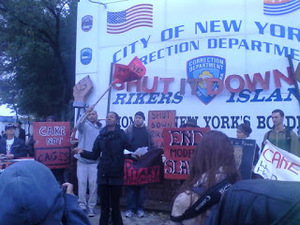Lives are irreparably damaged every day in the largest U.S. jail
Join in a non-violent direct action and protest to Shut Down Rikers Island, October 23, 2015.

Just 300 yards from the runways at LaGuardia airport, just a few miles from a glistening city, an island sits dedicated to confinement, brutality, and torture of our youth and others. Human beings languish for weeks, months, sometimes years awaiting trial. Many simply for lack of money for bail. Many locked down for weeks and months in solitary confinement. Guards inflict a culture of violence - fractured jaws, broken bones, denial of medical care, cover-ups and retaliation against those who report, and rampant sexual violence against the women and LGBT people as well as the men. Rikers typifies and concentrates the immorality and illegitimacy of mass incarceration in the U.S.
It is difficult to say which is a greater shock to the conscience: that this torture and brutality goes on day in and day out, or that millions go about their daily lives accepting this as normal just miles away.
The violence against inmates at Rikers has been studied. It has been exposed. Guards have been sued. Settlements have been paid. The deaths inflicted through brutality and negligence have been documented. The life-long trauma and disfunction imposed on inmates has been proven. Yet the brutality continues day in and day out. All this is plain for the whole world to see.
The time for wringing our hands is over. The time for cosmetic but essentially meaningless reforms is over. A line must be drawn. People of conscience must put our bodies on the line to stop this depravity and barbarity, else we ourselves are complicit.
WHICH SIDE ARE YOU ON?
This call was initiated by:
Nellie Bailey, Harlem activist
Rev. Jerome McCorry & Candace McCorry, Rise Up October Faith Task Force
Rev. Stephen Phelps, Member, Presbytery of New York City*
Cindy Sheehan, mother of Casey Sheehan, killed in unjust U.S. war on Iraq, 2004
Sunsara Taylor, writer for Revolution Newspaper, initiator of StopPatriarchy.org
Mia Thornton, NYU Student Activist
Jame Vrettos, Professor John Jay College of Criminal Justice*
* for identification purposes only
It takes real courage to speak out ... when your loved one who has just been murdered by the police is also being demonized ... when the authorities and the media spin the narrative in order to justify murder by police. It takes real courage to stand tall when how you raised a child or handled a mental illness episode is questioned as if somehow you were responsible for the police murdering your loved one...
Join the Community of Freedom Fighters
When you donate to #RiseUpOctober, you make a concrete and material difference in strengthening the fight to STOP MURDER BY POLICE. You make it possible to:
print the palm-cards, posters, and stickers
maintain the website, national office, and phone-lines
get the word out far and wide
assist families of those police killed to travel to NYC to make their voices heard
You concretely advance the fight to change the course of history.
But that is not all, when you donate, you join a community of people across this country who are standing for justice. This is a moral act and it is part of bringing into being, right now, the shoots of the world we are fighting for -- one where no one turns their heads when others are oppressed and terrorized, where justice is real.



